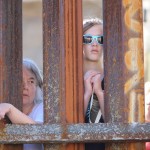Editors’ Note: This article is part of the Patheos Public Square on Immigration and Refugees. Read other perspectives here.
As a Mexican American Catholic, I think asking whether the influx of immigrants and refugees is a threat or an opportunity is the wrong question; their presence is not merely a political, economic, cultural, or national security problem to be solved. Their presence among us is ultimately a reality that calls for mercy, not just for their sake but ours as well. Instead of those questions, many in our Hispanic communities are struggling with more basic ones, like how do we remain faithful and hopeful when so many of our country’s leaders toy with immigration issues for political gain. I have found some answers in unlikely places.
Some months ago, I volunteered at an immigration detention center to serve the religious needs of detained Central American women and children. Many of them are attempting to escape the gang violence that is roiling Guatemala, Honduras, and El Salvador. If they fail and our government deports them, those mothers will likely lose their children to forced gang recruitment or rape, and eventually death. Through conversation and prayer, detained mothers spoke powerfully of their sheer desperation and powerlessness; of not knowing how long our government will detain them or whether it will deport them; of seeing their children, many as young as my daughters (five and seven), grow up as detainees.
That experience and others have given me a humbling awareness of the oblation that many undocumented immigrants and refugees make with their lives. They have helped me see what Daniel Groody and many others who serve them and their families see: a deep connection between the broken bread of the Eucharist and the brokenness that immigrants endure for the sake of their loved ones. In Groody’s words,
[Immigrants] take up the decision to leave their homeland, bless God for the gift of their lives and families (even in the midst of tremendous suffering), break themselves open so they can feed those they love, and give themselves away for the nourishment of others, even at the cost of their lives.
I have seen that self-giving love at the detention center, in parishes, at schools, and in many other places. I have witnessed immigrant children, women, and men who offer themselves as a living sacrifice, not publicly at the parish altar but intimately at the altar of their lives (Lumen gentium, 10).
To be clear, I do not intend to romanticize or justify the suffering of the innocent, especially in the case of detained children. My aim is to give witness of their faith, of their “participation in the one priesthood of Christ” through their share in the common priesthood of the baptized (Lumen gentium, 10). Their oblation is a powerful witness of God’s love and has me question how those of us who also identify as Christ’s disciples in this country are responding.
In the case of American Catholics, we have joined other Catholics across the world in celebrating a jubilee year of mercy that is helping renew the language of mercy in the public square. Quoting John Paul II, Pope Francis reflected that doing so is necessary because “the present-day mentality, more perhaps than that of people in the past, seems opposed to a God of mercy, and in fact tends to exclude from life and to remove from the human heart the very idea of mercy” (Misericordiae vultus, 11). That seems to be an apt description of the way that our country shuns the notion of mercy from our immigration debate. It also describes the task at hand for Catholics who wish to hope against all hope.
Mercy, St. Thomas Aquinas reminds us, is an effect of charity. Charity, in turn, is a graced love that we partake with God and neighbor through friendship with God. For St. Thomas, we feel mercy toward friends who are suffering, to the point of suffering with them. This is, in a way, what Christ felt for us. When explaining the meaning of mercy, though, St. Thomas makes an observation that should make American Catholics and fellow Christians tremble: the ones who are least inclined to feeling merciful are those “who think themselves happy and powerful enough that they think that they are unable to be afflicted by anything bad…” (ST II-II, Q. 30, Art. 2) A false sense of happiness and power robs those persons of the ability to relate to friends in need because they believe that they will never be in dire straits. Reading St. Thomas’ observation with our immigration debate in mind, I wonder if we deem ourselves so happy and powerful a nation that we think with all certainty that neither we, nor our descendants, will ever be in need of another people’s mercy and solidarity.
Whether or not that is the case, for St. Thomas, friendship with God not only opens us to feeling merciful toward our friends as Christ did for us. It also inspires beneficence to end their suffering as Christ did for us. Some may argue that immigrants and refugees, especially those who crossed the border illegally, are not our friends. On that point, St. Thomas acknowledges that we relate to one another through many kinds of friendships — including those of the familiar, civic, or spiritual kind — and that each kind of friendship calls for particular benefits. Thus all friendships, including those with foreigners who come into our lives, call for benefits “depending on the time and place and situation” (ST II-II, Q. 31, Art. 3). And here again St. Thomas may make some American Catholics and fellow Christians uncomfortable by finding that “in some instances a stranger should be helped more than even one’s own father — say, if the stranger is in extreme need and one’s father is not suffering such great need” (ibid.). That view from the tradition has strong implications for the immigration debate and our government’s decision to detain Central American women and children who are attempting to escape violence at home.
The voices of detained women and children alongside St. Thomas’s insights on the tradition speak powerfully of the influence that a graced friendship with God should have in how we see immigrants and refugees. In that light, then, to remain hopeful we need to heed the shared faith that many immigrants and refugees give witness to, and we must embody a mercy that echoes Christ’s own.
— — —
To learn about how you may support the pastoral needs of refugees during their detention and after their release in the San Antonio, TX, area, please visit the website for San Antonio’s Catholic Charities and the Interfaith Welcome Coalition.










